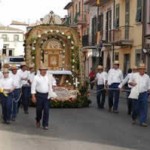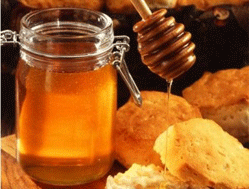 In the City of Marta, a fraction of Bolsena, is celebrated every May 14th the traditional Barabbata, a propitiatory ceremony, of pagan origin, that worships at the shrine of the Madonna del Monte.
In the City of Marta, a fraction of Bolsena, is celebrated every May 14th the traditional Barabbata, a propitiatory ceremony, of pagan origin, that worships at the shrine of the Madonna del Monte.
There’s a great historical parade which follows a strong hyerarchical order: the casenghi, peasants, fishermen and other representatives of arts and crafts, dressed in traditional costume, on floats.
The parade is open by the Casenghi with their horses, then the Bifolchi, ie those who plowed and worked the land with a plow pulled by oxen to nail. The category also includes the Portaspese, or those in charge of carrying a donkey with the food during farm work, and the Pastori who lead their goats and sheep wagons. Then the Villani, which were responsible for any hard work setting; these were divided into several categories: the Sementerelli, ie the sowers, that carry large sacks of seed, then the Vanghe, the Mietitori, which carry the “Gregna” (sheaf) of wheat and the sickle, then the Falciatori, with large scythes hay. Rounding out the parade dedicated to the categories of workers are the Fishermen, bringing in fishes from the lake.
 When the procession reached the church of Madonna del Monte, and after repeated a homage to the Virgin with the ritual: “Evviva Maria, sia lodato il Santissimo Sacramento, Evviva la Madonna Santissima del Monte, Evviva Gesù e Maria“, a Mass is celebrated. At the end there’s the most picturesque, mysterious and controversial part of the celebration (over the centuries it has been repeatedly banned and then re-admitted): the three Passate (laps) that everyone make in order to enter from the door of the church and leave through the sacred area of the Presbytery along with tools and animals and making a big noise, certainly unusual for a sacred place. In the last lap participants leave the gifts on the altar and in return they receive from the Lords of Celebration the traditional festival bun.
When the procession reached the church of Madonna del Monte, and after repeated a homage to the Virgin with the ritual: “Evviva Maria, sia lodato il Santissimo Sacramento, Evviva la Madonna Santissima del Monte, Evviva Gesù e Maria“, a Mass is celebrated. At the end there’s the most picturesque, mysterious and controversial part of the celebration (over the centuries it has been repeatedly banned and then re-admitted): the three Passate (laps) that everyone make in order to enter from the door of the church and leave through the sacred area of the Presbytery along with tools and animals and making a big noise, certainly unusual for a sacred place. In the last lap participants leave the gifts on the altar and in return they receive from the Lords of Celebration the traditional festival bun.
 Preparing for the event takes months and months of work and involves most of the population from Marta, which spend those day in company, singing, chorusing and dinnering.
Preparing for the event takes months and months of work and involves most of the population from Marta, which spend those day in company, singing, chorusing and dinnering.
Sources: barabbata.it and canino.info both in italian language.



 Scaricate la
Scaricate la 